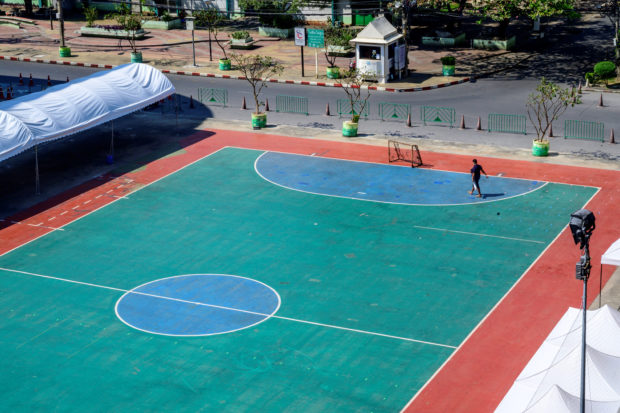Lockdowns, curfews, alcohol bans as nations fight resurgent virus

A man walks on an empty training court in Bangkok on January 2, 2021, closed after the capital announced on Saturday partial lockdown measures to deal with a recent uptick in Covid-19 coronavirus cases. (Photo by Mladen ANTONOV / AFP)
PARIS, France – Countries across the world tightened restrictions on their populations Saturday to fight a resurgence in the coronavirus, as the European Union offered to help drug companies expand vaccine production to improve distribution “bottlenecks”.
From local curfews, to alcohol bans and complete lockdowns, governments are trying to tackle a surge in cases.
The coronavirus has killed more than 1.8 million people globally since emerging in China in December 2019, according to a tally from official sources compiled by AFP.
But experts fear the worst is yet to come, predicting a sharp rise in cases and deaths after weeks of holiday gatherings.
French police booked hundreds of New Year revellers for flouting anti-Covid measures at an illegal rave.
Article continues after this advertisementIn Bangkok, the city’s nightlife shut down following a ban on bars, nightclubs and restaurant alcohol sales, among a raft of restrictions aimed at curbing the kingdom’s rising coronavirus toll
Article continues after this advertisementPublic schools in the Thai capital are to close for two weeks.
An outbreak last month at a massive seafood market has led to a resurgence of the virus in Thailand, with infections detected in 53 of the kingdom’s 77 provinces.
In Tokyo, the city’s governor on Saturday asked Japan’s government to declare a new state of emergency as the country battles a third wave of the coronavirus, with record numbers of new cases.
Vaccine race
The soaring number of infections around the world means the race to vaccinate is set to dominate the coming year.
But delays in getting the vaccines were not the fault of the European Union, said the bloc’s health commissioner Stella Kyriakides.
“The bottleneck at the moment is not the volume of orders but the worldwide shortage of production capacity,” she said.
The bloc would help drug companies in their efforts to develop candidate vaccines, she added.
“The situation will improve step by step.”
India on Saturday staged nationwide drills to start one of the world’s biggest coronavirus vaccination programmes as the drug regulator prepared to approve the AstraZeneca-Oxford University shot.
In the United States, the vaccination programme has been beset by logistical problems, even as the world’s worst-hit country passed 20 million cases.
In Russia, Health Minister Mikhail Murashko said that more than 800,000 people had received the domestically produced Sputnik V vaccine and that 1.5 million doses had been distributed throughout the country of around 147 million.
The Kremlin has held back on imposing nationwide virus restrictions, instead placing its hopes on the mass vaccination drive to end the pandemic and save its struggling economy from the hit of another lockdown.
The French government, facing the threat of a new wave of Covid-19 infections, lengthened an overnight curfew by two hours in parts of the country to help combat the virus.
The curfew will start at 6 pm, rather than 8 pm in parts of France, mainly in the country’s east. Paris has, for now, been spared the additional restriction.
‘We had to party’
The new French restrictions came as police booked more than 1,200 revellers Saturday following an illegal rave in northwestern France finally ended after more than two days of partying that also saw clashes with police.
Of those, around 800 people were booked for flouting anti-virus measures, while the regional health authority in Brittany noted the “high risk of the spread of Covid-19” at the event.
“We knew what we were risking… we had to party, for a year everything has been stuck,” said one of the revellers, a 20-year-old waitress.
Spanish police broke up another gathering Saturday near Barcelona, where 300 people had been partying for more than 40 hours.
And footballers were also among those caught breaking coronavirus rules, with Tottenham’s Erik Lamela, Sergio Reguilon and Giovani Lo Celso to be disciplined after a pictured emerged of them attending a large party.
Norway, which has one of the lowest infection rates in Europe, on Saturday began requiring Covid-19 tests upon arrival into the country, after finding five cases of a new coronavirus variant that first emerged in Britain.
Denmark discovered 86 cases of the new variant, which is believed to be more contagious.
The tiny British enclave of Gibraltar, off Spain, went into a 14-day lockdown Saturday. Chief Minister Fabian Picardo said the virus was spreading “more quickly than we can control it”.
Greece has extended until January 10 its strict two-month lockdown measures, ending an easing of the restrictions over the holiday period.
In Lebanon, medics warned that hospitals are being overwhelmed by coronavirus cases, in the wake of end of year holidays.
But in Australia, the finishing touches were being put on a glitzy show at the Sydney Opera House Saturday, as the venue prepared to host an opera crowd for the first time since March following a virus hiatus.
gsg
For more news about the novel coronavirus click here.
What you need to know about Coronavirus.
For more information on COVID-19, call the DOH Hotline: (02) 86517800 local 1149/1150.
The Inquirer Foundation supports our healthcare frontliners and is still accepting cash donations to be deposited at Banco de Oro (BDO) current account #007960018860 or donate through PayMaya using this link.